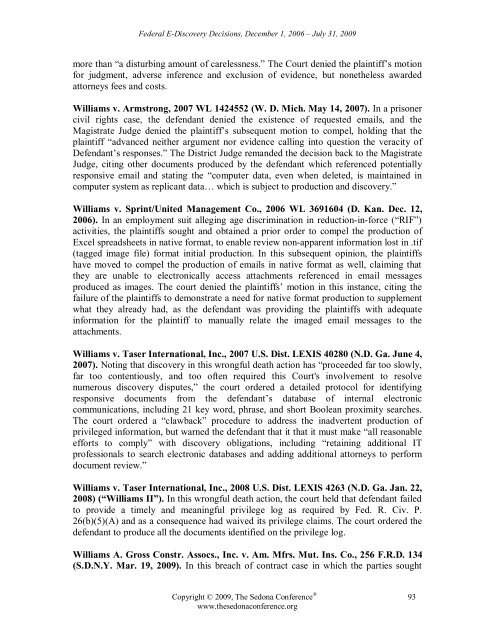Federal Court Decisions Involving Electronic Discovery, December 1 ...
Federal Court Decisions Involving Electronic Discovery, December 1 ...
Federal Court Decisions Involving Electronic Discovery, December 1 ...
You also want an ePaper? Increase the reach of your titles
YUMPU automatically turns print PDFs into web optimized ePapers that Google loves.
<strong>Federal</strong> E-<strong>Discovery</strong> <strong>Decisions</strong>, <strong>December</strong> 1, 2006 – July 31, 2009<br />
more than “a disturbing amount of carelessness.” The <strong>Court</strong> denied the plaintiff’s motion<br />
for judgment, adverse inference and exclusion of evidence, but nonetheless awarded<br />
attorneys fees and costs.<br />
Williams v. Armstrong, 2007 WL 1424552 (W. D. Mich. May 14, 2007). In a prisoner<br />
civil rights case, the defendant denied the existence of requested emails, and the<br />
Magistrate Judge denied the plaintiff’s subsequent motion to compel, holding that the<br />
plaintiff “advanced neither argument nor evidence calling into question the veracity of<br />
Defendant’s responses.” The District Judge remanded the decision back to the Magistrate<br />
Judge, citing other documents produced by the defendant which referenced potentially<br />
responsive email and stating the “computer data, even when deleted, is maintained in<br />
computer system as replicant data… which is subject to production and discovery.”<br />
Williams v. Sprint/United Management Co., 2006 WL 3691604 (D. Kan. Dec. 12,<br />
2006). In an employment suit alleging age discrimination in reduction-in-force (“RIF”)<br />
activities, the plaintiffs sought and obtained a prior order to compel the production of<br />
Excel spreadsheets in native format, to enable review non-apparent information lost in .tif<br />
(tagged image file) format initial production. In this subsequent opinion, the plaintiffs<br />
have moved to compel the production of emails in native format as well, claiming that<br />
they are unable to electronically access attachments referenced in email messages<br />
produced as images. The court denied the plaintiffs’ motion in this instance, citing the<br />
failure of the plaintiffs to demonstrate a need for native format production to supplement<br />
what they already had, as the defendant was providing the plaintiffs with adequate<br />
information for the plaintiff to manually relate the imaged email messages to the<br />
attachments.<br />
Williams v. Taser International, Inc., 2007 U.S. Dist. LEXIS 40280 (N.D. Ga. June 4,<br />
2007). Noting that discovery in this wrongful death action has “proceeded far too slowly,<br />
far too contentiously, and too often required this <strong>Court</strong>'s involvement to resolve<br />
numerous discovery disputes,” the court ordered a detailed protocol for identifying<br />
responsive documents from the defendant’s database of internal electronic<br />
communications, including 21 key word, phrase, and short Boolean proximity searches.<br />
The court ordered a “clawback” procedure to address the inadvertent production of<br />
privileged information, but warned the defendant that it that it must make “all reasonable<br />
efforts to comply” with discovery obligations, including “retaining additional IT<br />
professionals to search electronic databases and adding additional attorneys to perform<br />
document review.”<br />
Williams v. Taser International, Inc., 2008 U.S. Dist. LEXIS 4263 (N.D. Ga. Jan. 22,<br />
2008) (“Williams II”). In this wrongful death action, the court held that defendant failed<br />
to provide a timely and meaningful privilege log as required by Fed. R. Civ. P.<br />
26(b)(5)(A) and as a consequence had waived its privilege claims. The court ordered the<br />
defendant to produce all the documents identified on the privilege log.<br />
Williams A. Gross Constr. Assocs., Inc. v. Am. Mfrs. Mut. Ins. Co., 256 F.R.D. 134<br />
(S.D.N.Y. Mar. 19, 2009). In this breach of contract case in which the parties sought<br />
Copyright © 2009, The Sedona Conference ® 93<br />
www.thesedonaconference.org
















